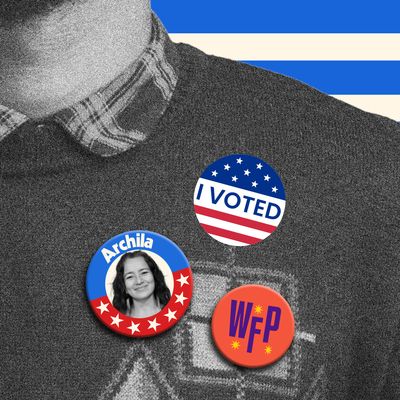
Before Alexandria Ocasio-Cortez and her socialist allies dramatically upended politics as we once knew it, three incumbent state legislators losing in one night would have been a big deal.
José Rivera of the Bronx, Tom Abinanti of Westchester, and Kevin Cahill of the Hudson Valley will not be returning to Albany next year, according to unofficial returns. Cahill’s replacement, climate organizer Sarahana Shrestha, is a committed socialist who ran with the strong backing of the Democratic Socialists of America. Meanwhile, Abinanti lost to a local legislator supported by the Working Families Party.
Yet the narrative coming out of Tuesday is one of progressive failure. Both the DSA and the Working Families Party ran large slates in the Assembly primaries, and almost all of them lost. At the top of the ticket, the WFP-endorsed Jumaane Williams and Ana María Archila, lost badly in the races for governor and lieutenant governor, respectively. Kathy Hochul and Antonio Delgado were triumphant, far outrunning their opposition on both the left and the right.
August may hold more hope for the left when voters cast ballots in the primary for State Senate and congressional seats — at least one socialist is a front-runner for a State Senate seat in Queens and Manhattan — but it’s clear 2022 will not produce the enormous gains of 2018 and 2020 when it seemed routine for young, charismatic leftists to rush into power. Since then, the political environment has shifted, with crime and inflation gobbling up oxygen. Voter enthusiasm was higher in the Trump years; run-of-the-mill liberal voters and leftists formed enormous and potent anti-Establishment coalitions that are now harder to replicate.
“I don’t think the progressive movement is dead,” says one high-ranking Democratic operative unaffiliated with the insurgents. “It was a boring election. I voted just to be a voter. I wasn’t running to the polls. I think progressives do well when people are excited and interested.”
By recent standards, Tuesday’s turnout was extremely low. In New York City, fewer than 450,000 Democrats came to the polls. More than double showed up for the competitive mayoral primary a year ago, a victory for the moderate Eric Adams that, had there been less infighting on the left, could have buoyed a progressive rival. In past cycles, left-wing challengers have won in low- and high-turnout environments alike. Ocasio-Cortez defeated Joe Crowley in a June 2018 primary that saw relatively few voters, but that September, with the governor’s race and all state legislative primaries on the ballot, turnout ballooned and a large number of progressive and socialist insurgents cruised to victory. The pattern seemed to repeat in 2020 when the deadly early months of the pandemic couldn’t keep voters away — many were allowed to vote by mail and did so in elevated numbers for a Democratic Socialist slate that won every primary it competed in. On that same day, Jamaal Bowman knocked Eliot Engel out of office and joined the Squad.
One reality of Tuesday was that incumbency trumped ideology. If conservative Democrats like Michael Benedetto in the Bronx could easily repel left-wing rivals, so could two socialist assemblywomen, Emily Gallagher and Phara Souffrant Forrest, who breezed past their primary opponents. If a candidate held office already, the law of political gravity applied: The candidate was very likely to win.
Progressives and socialists are frustrated because 2018 and 2020 seemed to indicate a certain movement was ascendant, not plateauing. When Ocasio-Cortez won, she took advantage of a listless, entitled political Establishment. Four years later, incumbents can’t be surprised any longer. Many fundraise effectively, talk to voters, and enlist help from outside forces like the real-estate industry, which continues to spend heavily against socialist candidates. Winning is simply harder today. “We rely on our base to come out too,” says Matthew Thomas, a socialist writer and active DSA member. “The story is the strength of incumbency. You saw progressive challengers really struggle.”
The DSA did not invest in any statewide contests, but the Working Families Party did. The left-wing third party, a blend of activists and some organized labor, had a poor showing at the top of the ticket, backsliding from 2018 when Williams was a candidate for lieutenant governor and came close to beating Hochul, who was then Andrew Cuomo’s little-known running mate. In 2021, Williams opted for a rematch against Hochul, and Archila was recruited into the lieutenant governor’s race in March. Williams struggled with personal challenges and never campaigned aggressively or raised much money. Archila, who eventually won the endorsement of Ocasio-Cortez, built more momentum but ran up against Delgado, the new incumbent lieutenant governor and a former congressman who could raise gobs of money. Neither progressive built a viable campaign — the Working Families Party didn’t do it for them — and it showed. They had no coattails down the ballot.
Without a sufficient fundraising operation, progressive insurgents will never effectively compete in statewide elections. Hochul and Delgado spent millions on TV and digital ads, while Williams and Archila were comparatively absent. Much of the race felt like a fait accompli as it became clear the Working Families Party had developed no serious plan for getting its ticket on the airwaves. It was, as with Malcolm Kenyatta’s recent defeat in his Pennsylvania Senate race, a notable failure to scale upward. Hochul now gets what she always wanted: a chance to train her fire on a right-wing Republican and ignore the left entirely.



























